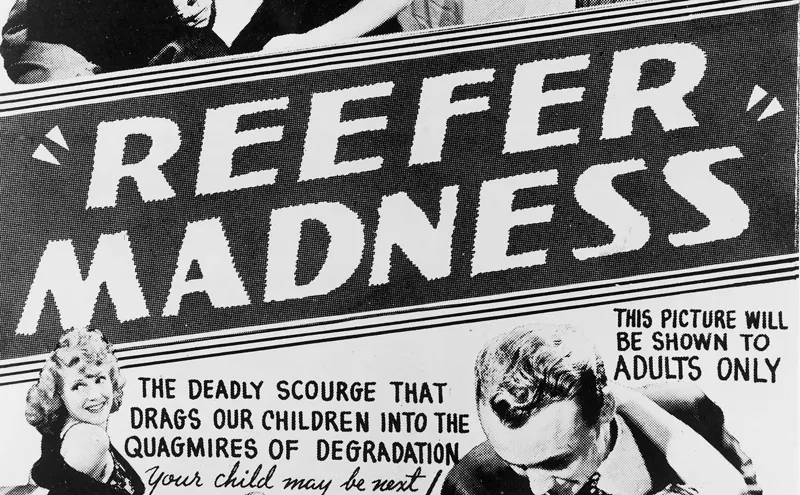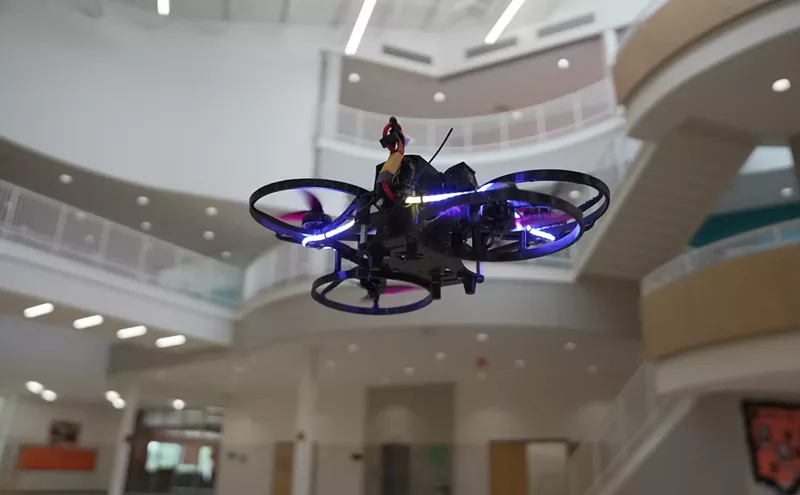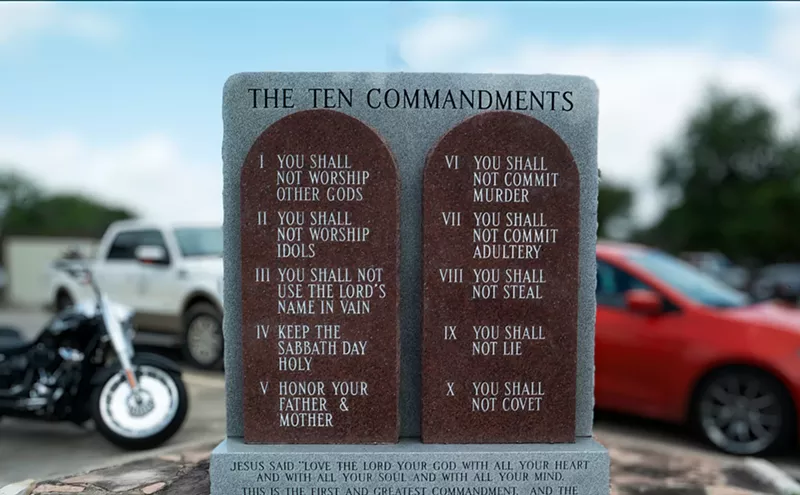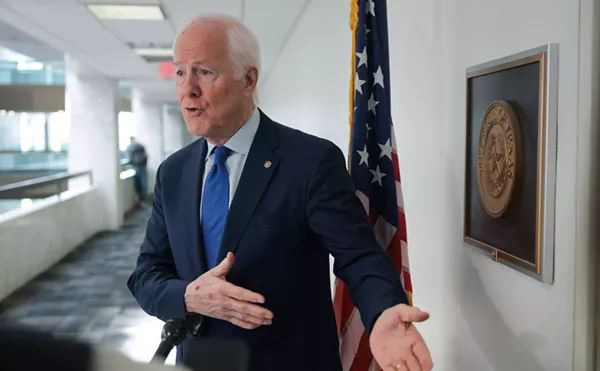In attendance were many of the city's top plaintiffs' lawyers, the side of the legal world representing patients against doctors, injured workers against employers, the guy whose van got rear-ended against the other guy's insurance company. Powered by multimillion-dollar contingency fees, some rank among the heaviest political hitters in town.
Despite the festive backdrop and flowing beer, lawyer Fred Baron was not in a party mood.
The meeting had been called to decide whether 14th District Court Judge John Marshall, a quirky individualist with a habit of making news, should be targeted for defeat in the March 14 Republican primary. Baron, who recently hosted a $25,000-a-couple fundraiser with President Clinton at his $5.2 million walled estate in Preston Hollow, was among the most influential lawyers in the room. And he made no secret of the fact he wants Marshall's head.
"He isn't running on all eight cylinders," Baron said later. "He's gone over the edge."
On one level, the meeting had all the markings of a beer-hall revolt, a rare event considering that lawyers rarely rise up so publicly against sitting state court judges.
It's more like a "vendetta," says Marshall campaign manager Brian Mayes. Baron, he says, wants retribution for the judge's decision to refer Baron's 50-lawyer firm to the grand jury in 1998 over alleged coaching of clients in asbestos cases. Baron & Budd was embarrassed nationally by a paralegal's memo that outlined for clients the correct answers to critical questions in their health-related damages claims. Former employees admitted to implanting memories while preparing witnesses, but the grand jury took no action against the firm.
Baron, known as the "king of toxic torts" for the wealthy practice he has built, has only contempt for Marshall, although he insists it has nothing to do with the coaching matter. Never mind that Baron was not at all exercised about Marshall four years ago during the judge's previous re-election bid.
Shirley Sutherland, a board member of the Dallas Trial Lawyers Association, the group holding the brewery event, says it appeared Baron packed it with associates and like-minded lawyers. "He was pushing for a vote to target Marshall," she recalls. But as an equal and opposite force, lawyer Frank Branson was also in the room. Branson, known for his record-setting judgments in personal injury lawsuits involving everything from plane crashes to faulty amusement park rides, moves in the same lofty universe as Baron, and is just as influential in Bar politics and beyond. Both have raised millions for the national Democrats.
And Branson happens to like Marshall. "I said I found him to be a good judge, a man of high integrity who's been fair and well-versed on the law. My clients have always been treated fairly," Branson recalls telling the group.
Ultimately, talk at the brewery meeting got down to whether to target Marshall's race with campaign money from a newly organized political action committee. The plaintiffs' lawyers wanted a club to wield against judges they deemed overly friendly with corporate defendants and insurance companies, which is a popular stance in the courthouse in as conservative and business-friendly a place as Dallas.
With the trial lawyers in the room roughly split down the middle, the group reached no conclusion about Marshall that day in late July. They didn't do any better six months later, in early February, when a group of lawyers controlling the PAC met at an Oak Lawn seafood restaurant and took no action to spend the $50,000 they had raised. "We don't talk about it anymore," says medical malpractice specialist Bill Liebbe, the group's president. "It was causing too much division."
Judging John Marshall has turned out to be a difficult job, to be sure. Some say he's erratic and far from impartial. Others say he's just eccentric, but driven by conscience.
Whatever the verdict, enough well-heeled lawyers are after his hide that he's landed in the most talked-about judicial race this year.
Known more widely for his rulings halting live pigeon shoots at the Dallas Gun Club last December, and for temporarily stopping the cutting of trees at Old East Dallas' Tenison Park golf course in late 1998, Marshall is in the toughest race of his 19-year career. In effectively one-party Dallas County, the GOP primary constitutes the whole race. He's on the ropes because forces at the courthouse have gathered against him and reached critical mass. Enough money, political energy, and big-name support is behind his opponent to ensure a close contest.
Lawyer-supplied campaign money has flowed evenly to Marshall and his challenger, big-firm lawyer Mary Murphy -- $151,056 and $144,340, respectively, to date. "John has always been John," says Tom Pauken, a former state GOP chairman, a lawyer, and a Marshall supporter. "What's happened is that a number of firms on both sides [plaintiffs and defense] are unhappy with the results they've been getting down there."
Described as quirky, "a little different," Marshall is far more comfortable than most judges at making bold calls and making up his own mind about what constitutes the civil law. To supporters, this is called being "slightly mercurial" or "having an agile mind." Mike Parham, who handles serious injury and death cases, says being hard to predict isn't especially a fault. "He is a bit of a wild card, but when he calls them, he isn't predictable for or against either side of the docket." Besides, Parham says, as a lawyer fighting for underdogs, he likes a man who will take on an institution such as the Dallas Gun Club. "It's a Who's Who of Highland Park. Executives with shotguns. It took a lot of courage to do that. You make a lot of powerful enemies and not a lot of friends. Who cares about pigeons, anyway?"
There are a legion of critics, though, whose cumulative complaints have turned Marshall's performance ratings in the annual Bar poll into the worst in the courthouse. Some 58 percent of the 685 lawyers responding said Marshall does not correctly apply the law; 51 percent disapproved of his performance overall. Just 50 percent think he's impartial. In a recent preference poll, 60 percent of the lawyers who voted said they prefer his opponent, Mary Murphy, a former partner in Jenkens & Gilchrist.
"The thing I need in court in any case is for the judge to apply the law fairly and with reason. Marshall gets reversed [by appellate courts] half the time, so it's like flipping a coin," Baron says. Marshall's habit of having his cases overturned "adds layers of expense and delay" for both sides, he says, "and it's been that way for a long time." Marshall cites statistics saying he is overturned less: about one-third of the time.
He had 16 reversals in 1999, according to a review of appeals listed on an appeals court Web site. Nearly all were for taking the decision away from the jury once the trial was under way and deciding cases himself -- "directed verdicts," in legal parlance.
Typical, says attorney Mary Alice McLarty, was the case of Maria Martinez, a nanny who was beaten by an irate Park Cities parent. According to court papers, Martinez had worked for Mark and Julee Butler for six years when, one day in 1995, Mark Butler came home in a rage. He cursed her, threw her purse at her, grabbed her around the neck and hit her with a hard plastic golf club, then kicked her out the front door with his foot.
A jury found Butler guilty of misdemeanor assault and sentenced him to two years of probation. When it came to filing for civil damages, McLarty says, the case came down to a question of whether the Butlers had furnished the nanny a safe workplace. The lawsuit alleged that Julee Butler, an executive and the main earner in the family, "was negligent because she knew or should have known" that her husband had an "uncontrollable temper" and "violent propensities." About $100,000 in insurance money was at stake.
She knew how upset her husband was that afternoon, and that he had only a few weeks before yelled at Martinez for stopping by her own house while she was watching the Butler child, the suit alleged. At the trial in October 1998, McLarty says the judge assured her several times that she had made her case sufficiently enough that the seated jury should be allowed to render a verdict. In civil legal terms, it's called making a prima facie case. "He told all the lawyers several times in his office that we had met our prima facie burden of proof," McLarty says.
On the fourth day of the trial, though, Marshall issued a directed verdict, ruling, in effect, that there was no matter for a jury to decide. He sent the jury home and ended the case. "He just poured us out of court," she says. "The jury just sat there with its mouth open."
Legally, she says, the ruling held that there was no way Julee Butler could have known her husband would be violent. "Afterward, Marshall takes us all back in his chambers and tells my client she'd better move and watch out for this man. He tells the wife she needs to get away from that man; she and her children are in danger."
Those thoughts seemed at complete odds with his ruling, says McLarty, who says she has only been tossed out in that fashion once in 46 trials. "It was nonsensical."
Marshall says he has no recollection of either telling McLarty she had made her case, or of telling the parties anything in his chambers. "I've never made a guarantee to a lawyer in my life," he says.
As for directed verdicts, he says he's issued them in about 15 percent of his trials. "When a case doesn't go right for a lawyer, there's always someone to blame," he says.
McLarty says it almost pains her to speak out against the judge. "He married my husband and me in '96," she says. "I considered him a friend. But I can't ignore something like this. That lady was ready to get some justice, and what he did was just wrong." The case in the end was not added to the list of Marshall appeals because her client decided not to continue to fight, McLarty recalls.
These kinds of stories have been bouncing around for years at the granite conference tables of the city's white-shoe law firms, the 200-plus-lawyer partnerships that handle disputes between businesses, or defend then against such things as consumer claims. A lawyer at one such top 10 firm, declining to speak by name or to have his firm identified, says Marshall is "so high-minded, so iron-clad and rigid, nobody agrees with him. He thinks he is better than everyone else. He puts himself up on a pedestal and tries hard to act smarter than everyone else, which he is not. That's why he's insufferable."
Randy Johnston, a legal malpractice attorney and past president of the local trial lawyers group, puts it in even more concrete terms: "Marshall plays games up there. I never know what I am going to end up arguing in his court. The points he brings up come out of nowhere and everywhere. I might end up having to argue about the Magna Carta and whether Charlemagne had the best interests of the Holy Roman Empire at heart. Other judges bring up issues that I might not be prepared to argue, that I didn't think of, but you can always see how the judge came up with them and why they think they may be important. Not with him.
"The only good thing I can say is that he doesn't seem to have an agenda," adds Johnston, who says he has won in Marshall's court and has no ax to grind. "That is, he's not totally against all plaintiffs' lawyers or defense lawyers the way some judges are. In every case, he early on thinks who should win and ignores evidence and fits the law to accomplish that result."
Around the civil courts, lots of gossipy stories about erratic rulings and wacky comments abound, although most are either impossible to prove or would identify the source, most of whom wish to remain anonymous. Given that a Marshall win would put these lawyers in the awkward position of standing in court before someone they have so openly opposed, there's an understandable reluctance to speak out by name.
"I'm hosed anyway," says the trial lawyers' Liebbe, who agrees with Baron that Marshall's habit of having his rulings overturned on appeal is a sign of poor performance. "Quite a lot of the Bar has had enough of this nonsense. It's time for a new judge."
Fit and vigorous from practicing tae kwon do, John McClellan Marshall has the patrician look of a headmaster at a New England prep school. Boyish and youthful at 56, he puts off a formal, courtly vibe as he takes a seat in an upholstered swivel chair in his courthouse office. It's not surprising that he lists heraldry -- the study of coats of arms -- as a hobby on his résumé, which boasts knighthoods in sacred orders, memberships in chivalric societies, and Mensa, the club for certified geniuses. Between his extravagantly detailed 18-page résumé, his two decades on the bench, the various controversies surrounding him, and his volunteered knowledge of everything from court and legal history to missile guidance systems to his own genealogy, there's a lot to talk about.
Given his long and strenuous answers, he seems to enjoy the sound of his own voice. Marshall volunteers during his answer to the very first question that he is a direct descendant of John Marshall, the fourth chief justice of the Supreme Court, the legal giant who established the court's powers in the early days of the republic. He is connected through an almost uninterrupted line of lawyers.
"He has been an inspiration in a great new way over the years, certainly in my present career," says Marshall of his great-great-great-grandfather. "In the 35 years he sat as the chief justice, there were numerous occasions where the decisions that were rendered by that court were not, shall we say, popular in some parts of the community."
As an example, Marshall recounts, the chief justice wrote an opinion that the Cherokee Nation should by virtue of a treaty with the United States be treated as a sovereignty, as if it were France or England. He ruled that their land in Georgia should be protected from state interference and left intact. President Andrew Jackson responded with his famous quote, "John Marshall made his decision. Let him enforce it," and ordered the Army to evict the Cherokees, sending them on the Trail of Tears. "That took courage then, and I think some of the decisions that it has been my privilege to participate in have been ones that at the time were not universally popular," Marshall says.
The comparison is grandiose, but it fits well with the legal community's criticism of Marshall's courtroom style. Rather than simply interpret the law, Marshall seems to be striving for something more creative, more active, they say.
Two generations after the chief justice, the Marshall line arrived in Dallas in the late 1890s. Marshall's grandfather was returning to Virginia after joining the Klondike Gold Rush of 1896. He detoured to Dallas to see a cousin who was practicing law. The cousin offered him a job, and he stayed. "My grandfather built the first house in the town of Highland Park...at 3601 Lexington," Marshall says. "The house is still there."
Taking after his father, a rare engineer in the family tree, Marshall recalls building model rockets and firing them off in Goar Park, not so unusual a pursuit in the Sputnik-inspired '50s. "Some of them actually flew," he says.
Graduating from Highland Park High School in 1961, Marshall moved on to college at the Virginia Military Institute, a sort of kinder, gentler Citadel that Marshall says has had a big impact on his life as a judge, and in most other things. With its strict honor code, which says "a cadet does not lie, cheat, steal or tolerate those who do," Marshall says VMI instilled him with important life lessons. "Truth is truth...There is such a thing as objective truth. Aristotle said so," he says. "There are a lot of lawyers and a lot of professors who would snicker at that statement. They would say, 'Well, Judge Marshall is very quaint.'"
Marshall says that's why he takes such a dim view of lawyers making false statements in his courtroom -- why he referred Baron's firm to the grand jury when it appeared from a paralegal's memo that witnesses were being prepared illegally. "You can talk to four or five lawyers out of this building at random and ask them, 'Which judge are you least likely to want to risk having a false statement on an affidavit?'"
Marshall went on to get a master's in history at Vanderbilt University and worked as an instructor in the Skylab space program, writing textbooks for engineers and technicians, before returning to Dallas and SMU law school. Classmates there remember him as the type of eager student who would make eyes roll when he began to speak, usually at length, and he would do so often enough. "People say he became judge so he'd have a captive audience to listen to him," says one SMU alum.
After five years in private practice, Marshall says he was recruited by then-county GOP chairman Fred Meyer to run in what was still a county dominated by Democrats -- but not for long. He was swept into office in the Reagan landslide. "I've always been a Republican," Marshall says, adding that he cast his first vote in a presidential election for Barry Goldwater in 1964.
He can't emphasize this enough, given that one of his camp's main campaign strategies is to underline his opponent's shallow Republican roots.
On the bench, Marshall says he has followed his sense of principle and ruled decisively. In 1988, for instance, he ruled in a case of an AIDS patient attempting to obtain the drug AZT through Parkland hospital that the hospital had an obligation to dispense the drug, even though it was experimental at the time. "It was the right thing to do," Marshall says.
"You can ask anyone in town," he says, "Does Judge Marshall look over his shoulder and worry about being reversed before he rules on a case? I think the answer will be 'no.' He's not going to worry about the Court of Appeals." That attitude has him leading the county in appeals, as well as the number of appeals in which his rulings have been overturned.
Marshall would like to see himself above reproach, but his own ethics have been questioned in recent years.
In a story first reported by the Dallas Observer in 1997, Marshall faced accusations of favoritism after he had granted a client of the Bickel & Brewer firm a nearly $1 million summary judgment. Marshall was alleged to have accepted a limo ride to the firm's luxury suite at a Cowboys game and his court clerk received a $250 watch as a graduation present from a Bickel & Brewer paralegal while the case was pending. The same paralegal also bought a catamaran from Marshall, which he had advertised at the time for $1,500.
Although everyone denied wrongdoing, Marshall recused himself, and a visiting judge threw out the summary judgment. When those facts, which weren't in dispute, were presented to the State Commission on Judicial Conduct, the panel voted in February 1998 that nothing inappropriate had occurred.
"The facts were true," Marshall says now. "The innuendo was not."
In other words, Marshall can do things that appear untoward, but because he is so ethical, appearance is all there is.
Bickel says now the whole thing was much ado about nothing. He went to law school with Marshall and considers him a friend. "I think it's ridiculous for anyone who knows Judge Marshall to believe in good faith you could gain favor with him by doing anything for him," says Bickel, who is supporting Marshall. "He's his own man."
Marshall landed in another ethical flap last October, when it was reported that he had conducted a public opinion poll about his ruling to protect trees at the Tenison Golf Course. The telephone survey took place just days before the judge was set to rule for a second time on the trees -- after an appeals court ruled that the people attempting to stop the cutting did not have legal standing to sue. Respondents were asked whether they agreed or disagreed with the judge's December 1998 decision to halt the cutting.
This is another case of correct facts, wrong spin, Marshall insists. "People in the public eye take polls all the time in various ways," he says. "Do those questions condition the decisions, is that the issue? The answer is no."
Marshall's campaign manager Mayes, who says the poll was his idea, says the point of the survey was to determine Marshall's name recognition and whether he was communicating his message effectively.
Although the poll had been conducted while the Tenison case was pending, Marshall says he did not know he was going to rule again on it and did not know the results of the poll when the matter came up. He ended up recusing himself but will not release the results of his poll -- which continues to be an issue in the campaign. A source close to his opponent alleges it was a "push poll" containing a variety of negative statements about his opponent, which would explain why he has refused to release the results. Mayes and Marshall say it was not a push poll.
There could be no spin, however, to explain such ethical lapses as the mints. The little rolls of mint wafers Marshall popped into his mouth, one by one, during what stretched on to be two two-hour interviews. At the end, he offered his visitor a bunch of rolls from a dish on his console table. Packaged in red, white, and blue paper, they read, "Re-elect Judge Marshall."
It might not be covered in any college honor code, but state penal code section 39.02 prohibits elected officials from using their offices or time for non-state purposes. Bill Moss, an attorney with the Texas Ethics Commission, says he's pretty sure that includes a judge electioneering in his office with a bowl full of mints.
Ask Marshall's camp why he's facing such a fight this spring, and they mention two words: Fred Baron.
"Marshall has never been a friend to the big defense firms," says Bickel. "But this year you add to the mix his high-profile scuffle with the largest plaintiffs' firm in town, and the forces converge."
As early as last spring, Baron was casting about, looking for a candidate to back. "I talked to half a dozen people. We were looking for any candidate we could get who would be qualified to run against John Marshall, no doubt," he says. "It's a major sacrifice, giving up a lucrative practice to take a bench."
Among them was Mary Murphy, who started out as a paralegal, went to SMU law school, graduated at the top of her class, and landed a job at Jenkens & Gilchrist. A few years ago, she took a year off to work as a volunteer civil court master, handling all the stuff the judges hate -- discovery disputes and the like. She did it to prove to the county commissioners that hiring court masters would help grease the wheels of the court system.
Murphy acknowledges that Baron tried to recruit her but says she only made her decision when other lawyers asked her to run. Those circumstances have Marshall's camp characterizing Murphy as "the one Baron & Budd picked to run" -- a phrase that particularly agitates Baron. "I have never seen a campaign run with more inappropriate innuendo, to use a mild term. I had nothing to do with getting Mary Murphy to run. That's a lie, a complete and absolute lie," he says. Of course, once she was in the contest, his firm was near the front of the line of contributors with a $5,000 donation -- the maximum allowed by state law.
As a former partner in a big defense firm who is married to Greg Huffman, also a lawyer in a big establishment firm, Murphy doesn't appear on the surface to be a candidate hand-picked by any plaintiffs' lawyer.
Still, Mayes sees another link. Despite listing on her résumé memberships in the Dallas County Republican Party, Park Cities Republican Women, and Dallas Republican Career Women, Murphy was a solid Democrat only four years ago. In 1996, during President Clinton's reelection campaign, she gave $1,000 to the Democratic National Committee.
"We welcome her to the party," says Mayes. "But from her voting record and contribution record, she's a true blue Democrat."
Although party loyalty issues have little to do with the real forces behind this election -- a revolt of some big-money lawyers -- it could have more effect at the polls, where all the voters will be GOP.
As for Murphy, she says she's running because of what is truly wrong with Marshall's court. "The [Bar polls] accurately reflect the problems in this court," she says. "He defends his 50 percent approval rating by saying he's been there a long time and the people who are opposed to him have lost in his court. That explanation only works if you're ruling for the same 50 percent all the time. I am running because I want to stop judicial activism and the ignoring of the law."
Marshall says that's not his style at all. "I don't call it judicial activism," he says. "I would say I'm someone willing to make decisions and not punt. Judicial activism is anything but Pontius Pilate. I'm not going to wash my hands."
Former Dallas Observer staff writer Ann Zimmerman contributed to this report.












